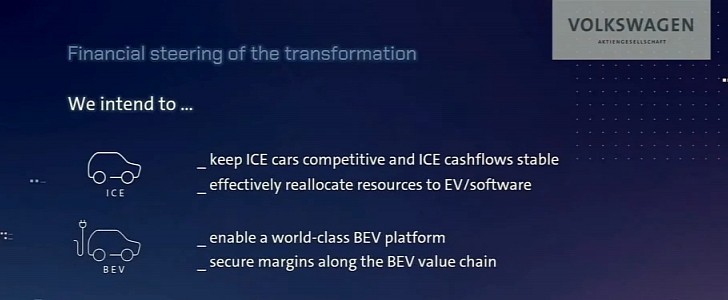While executives presented the Volkswagen New Auto strategy, it was clear that betting on EVs for the future does not imply the company will just get rid of the investments it has made so far in combustion engines. It is quite the opposite: the company relies on them to bridge its transition to electric mobility, as Arno Antlitz made very clear.
The Volkswagen Group CFO presented the company’s plant for a sustainable transition and stressed that the MQB platform would “help keep factories busy to a competitive level.” That gives a strong example of why going all-in on electrification is not possible: that would mean thousands of people would lose their jobs all of a sudden.
Volkswagen is gradually converting its factories to produce electric cars. Until all of its plants can do that, the company has to keep them working with what is currently available. That is why Antlitz said that the company needs to keep ICE vehicles competitive: to ensure a stable cash flow.
EVs and combustion-engined cars currently have a gap in profit margins. Volkswagen expects that gap to close within two or three years thanks to lower R&D (research and development) costs, battery cost savings, increasing economies of scale, and lower factory costs thanks to multi-brand plants.
If things go as planned, Volkswagen expects its EV sales to represent 50% of the total in 2030. That may happen even earlier: demand for ICE vehicles will get lower pretty soon. In Europe, China, and the US, anyone buying a car that burns fuel to move will risk higher depreciation sooner than ever. After all, who will want to buy a used car that may have traffic restrictions or even be banned in some places?
Volkswagen will prepare for that by simplifying its ICE lineup, offering fewer engine options, and trying to make EVs competitive as soon as possible. In other words, it will milk the ICE cow to feed the electric car initiative until it can walk with its own feet. The sooner, the better.
Volkswagen is gradually converting its factories to produce electric cars. Until all of its plants can do that, the company has to keep them working with what is currently available. That is why Antlitz said that the company needs to keep ICE vehicles competitive: to ensure a stable cash flow.
EVs and combustion-engined cars currently have a gap in profit margins. Volkswagen expects that gap to close within two or three years thanks to lower R&D (research and development) costs, battery cost savings, increasing economies of scale, and lower factory costs thanks to multi-brand plants.
If things go as planned, Volkswagen expects its EV sales to represent 50% of the total in 2030. That may happen even earlier: demand for ICE vehicles will get lower pretty soon. In Europe, China, and the US, anyone buying a car that burns fuel to move will risk higher depreciation sooner than ever. After all, who will want to buy a used car that may have traffic restrictions or even be banned in some places?
Volkswagen will prepare for that by simplifying its ICE lineup, offering fewer engine options, and trying to make EVs competitive as soon as possible. In other words, it will milk the ICE cow to feed the electric car initiative until it can walk with its own feet. The sooner, the better.








